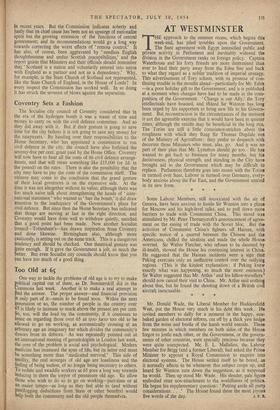Too Old at 65 One way to tackle the problems
of old age is to try to make political capital out of them, as Dr. Summerskill did in the commons last week. Another is to make a real attempt to nd the answer. The proper answer—and financial provision IS only part of it—needs to be found soon. Within the next generation or so, the number of people in the country over 65 is likely to increase to much above the present ten per cent. L. too, will the load 'on the community, if it continues to ist on regarding those over 65 as ipso facto too old to be -allowed to go on working, as automatically crossing at an arbitrary age an imaginary bar which divides the community's donors from its debtors. As was repeatedly pointed out at an international meeting of gerontologists in London last week, the core of the problem is social and psychological. Modern medicine has increased the span of life, but its latter end must be something more than ' medicated survival.' This side of Senility, the real scourges of old age are loneliness and the feeling of being useless, of no longer being necessary to others. To isolate and swaddle workers at 65 goes a long way towards inducing in them the torpor of premature old age. To allow those who wish to do so to go on working—part-time or at an easier tempo—as long as they feel able to (and without pettifogging deductions from State or other benefits) would help both the community and the old people themselves.


































 Previous page
Previous page